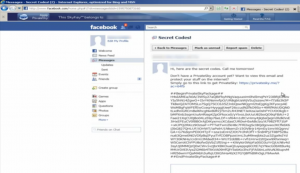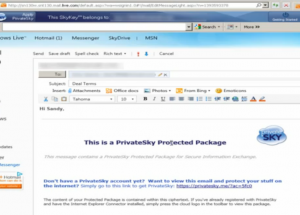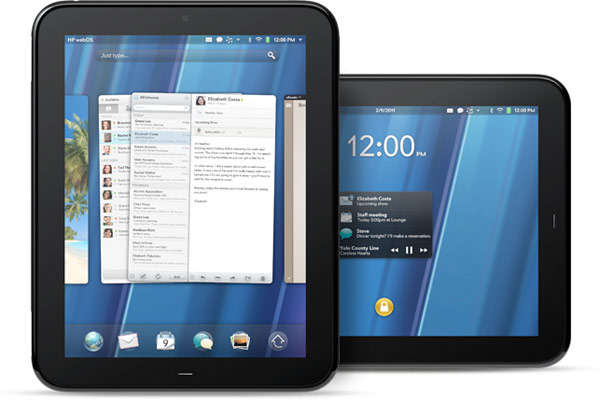Inbox icons, subject line sorcerers, CTA kings – the results are in. The 2025 You Mailed It Awards by Everlytic have crowned their champs, with Old Mutual Rewards and Machine_ taking…
On the fly encryption for Facebook, Gmail, the rest

A small security company called CertiVox has launched a free text encryption service call PrivateSky for use in browser-based messaging services. Despite the manifold risks, many Internet users still pass private, sensitive or embarrasing information over Facebook posts, Gmail accounts, blogs and other insecure public Web services. PrivateSky encrypts text, allowing only a trusted recipient to read it.
 It takes the form of a one-click encryption plug-in for Internet Explorer (only, at this point) that turns any text entered into a message box into gobbledegook (AES 192-bit with single-key if you want the gory details). The recipient can decypt it with a single click if they’re registered in your “Circle of Trust”.
It takes the form of a one-click encryption plug-in for Internet Explorer (only, at this point) that turns any text entered into a message box into gobbledegook (AES 192-bit with single-key if you want the gory details). The recipient can decypt it with a single click if they’re registered in your “Circle of Trust”.
If you’re old enough to have been on the Internet in the nineties, it will look disturbingly like someone’s re-warmed the old ROT13 text obfucating system so beloved of Usenet forums.
“It is literally one click encryption and decryption,” said CertiVox founder and chief executive Brian Spector (once you’ve registered, of course, and asked the people you want in your Circle of Trust to register).
 Since public online social media and messaging platforms are substantially insecure, PrivateSky gives smart users a way to exchange sensitive information securely on insecure platforms – get the convenience of Facebook, now with security. Ensuring that Facebook and Gmail connect over HTTPS is already a good start.
Since public online social media and messaging platforms are substantially insecure, PrivateSky gives smart users a way to exchange sensitive information securely on insecure platforms – get the convenience of Facebook, now with security. Ensuring that Facebook and Gmail connect over HTTPS is already a good start.
With PrivateSky you can now post amusing anecdotes about your weekend publicly on Facebook, but with details of substances abused, drunken hookups and waking up in a public lavatory encrypted with PrivateSky readable by only your close friends. If you communicate regularly with your accountant using Web-based chat, encrypting the text means that your financial information wont end up accidentally being exposed in a security snafu by the tech provider, or by a court order. Not a bad idea, as over time information on the Internet will slowly drift from more private to less private – especially as companies like Facebook constantly and stealthily push back the line of what’s yours and what’s shared with the world.
There is also an increasing level of attacks by digital miscreants attempting to infiltrate Web-based email services, especially the most polular ones. “There has been a variety of recent attacks on popular Webmail platforms,” said Trend Micro senior threat researcher Nart Villeneuve. “In addition to Gmail, Hotmail and Yahoo! Mail have also been targeted.”
Google has been in the news with claims that a cyber spying campaign originating in China had targeted Gmail accounts of US officials, military personnel, journalists, Chinese political activists and officials in several Asian countries, mainly in South Korea.
Encrypting email can thwart snooping, but the process has typically taken a bit of software savvy.
CertiVox started with IE because of its global popularity but is adapting the service to other Web browsing software. It has not given firm timelines on support for other browers. The company intends to eventually encrypt photos and other large data files as well as text.
The application for IE browsers is available for download online at https://privatesky.me.
– with reporting from AFP


